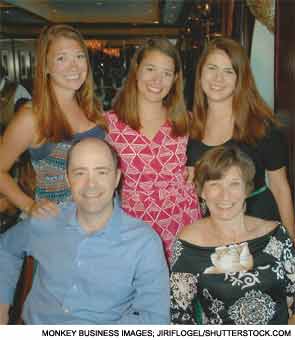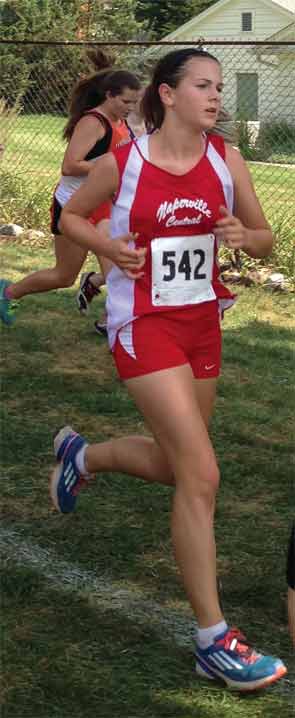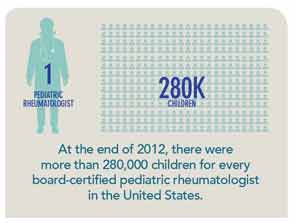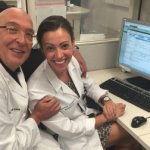
Steve Russell’s voice breaks with emotion as he talks about a remarkable moment in his daughter’s life. “The first time she ran that cross-country meet three months after being in the hospital was an amazing thing,” he says. At least half of the competitors had already finished the race, but Steve and his wife, Debbie, were waiting for their daughter Courtney. “Then she crossed the finish line, and Debbie and I are sitting on the finish line just crying, tears running down our faces.” Just three months before that touching moment, Courtney, at the age of 16, had spent four days in the hospital. She was diagnosed with systemic juvenile idiopathic arthritis (sJIA).
It all started nearly a year before that cross-country meet. As Courtney’s sophomore year in high school was getting into full swing, she started getting sick. She had a fever, rash, joint pain, and sore throat. After a few days, her parents took her to the doctor. The doctor told them it looked like a parvovirus infection and it would clear up on its own. In a few weeks, Courtney’s symptoms did clear up, but just a couple of months later, they were back. This time she also had hives that would come and go. “That lasted for months,” Debbie explains, “sometimes so severe on her hands that her hands would swell so she couldn’t even close them.” Courtney was taking painkillers, antiinflammatory drugs, and allergy medication, but nothing was helping.
This went on for about nine months. It was a difficult time for Courtney and the family. Courtney spent almost the entire school year in pain. “It got so bad that she couldn’t roll over at night without being in extreme pain; getting from the bed to go the bathroom was extraordinary,” Steve says. “To watch your child go through something like this is painful beyond words.” Still, Courtney kept up with her studies and even continued playing competitive volleyball through the end of the season. The Russells say, through it all, they learned just how tough kids are. “It was incredible how resilient and optimistic she was through this whole process, what she would deal with just to get through the school day,” Debbie proudly explains. Still, they wanted answers. She says, “It was gut-wrenching to just not know what was wrong with her and that we couldn’t do anything to help her.”

Eventually, two doctors suggested that the Russells see a rheumatologist. Both gave the same reason. “They’re brilliant at solving puzzles, solving the unknown. That’s who you need to see,” Steve explains. So they pushed their pediatrician to send them to a rheumatologist. Unfortunately, Courtney got worse very quickly, so Steve and Debbie took her to the Ann & Robert H. Lurie Children’s Hospital of Chicago. She was there for four days. During that time, the Russells met rheumatologist Marisa Klein-Gitelman, MD, who took the lead on Courtney’s case. Steve and Debbie say they knew she was the right doctor for them because of her extensive experience and her ability to connect with the whole family. In just a few days, Dr. Klein-Gitelman had Courtney’s diagnosis: sJIA with possible complications from macrophage activation syndrome (MAS).
After being admitted to the hospital, Courtney was forced to pull out of school shortly before finals. She started treatment right away with daily shots. Within weeks, Courtney was back on her feet. She finished her sophomore year over the summer. Then, she was running in that cross-country meet, being greeted at the finish line by her crying parents. “I always laugh because everyone in the audience was probably like, ‘They’re not very happy because their daughter didn’t do well,’” Steve says, “but we just couldn’t contain ourselves.” Today, she’s a senior in high school, still running cross-country and getting ready to go to college.
But the journey didn’t end there for the Russells. Dr. Klein-Gitelman told Steve and Debbie about the work being done by the Rheumatology Research Foundation. They wanted to get involved, so they helped organize a special event in April called “Coffee & Conversation,” which brought together patients and fellow parents of children with rheumatic diseases. They all heard from researcher V. Michael Holers, MD, about advances in research and treatment of inflammatory arthritis.

They also learned how few rheumatologists are currently practicing, especially pediatric rheumatologists. “We became more aware how blessed we are to have the resources we have and how many people don’t have these resources, don’t have [pediatric] rheumatologists in their state. … That was just mind blowing to us,” Steve explains. According to the American Board of Pediatrics (ABP), the organization that certifies pediatric rheumatologists, at the end of 2012, there were more than 280,000 children for every board-certified pediatric rheumatologist in the United States.
Adding to the problem, the ABP reports that 10 states don’t even have one pediatric rheumatologist. “To go through what we went through with Courtney with [a physician] so close was so, so hard,” Steve says. “I can’t fathom what it would be like going through something like that without a doctor that you trusted and counted on nearby.”
The Russells agreed to take their support one step further, pledging to donate $25,000 to the Foundation. “We are fortunate that we can help in some way,” Debbie explains, “so we feel we want to and need to.” Steve and Debbie both hope that, through the Foundation, they can reach more medical students and encourage them to study rheumatology.
They also believe in the research being supported by the Foundation. With his daughter in mind, Steve explains what motivated them: “Just doing anything we can to find a cure so nobody has to go through this, so no kids have to go through this.
Courtney is probably going to deal with this for life. We’d love to think that the cure is around the corner and we can help.”


